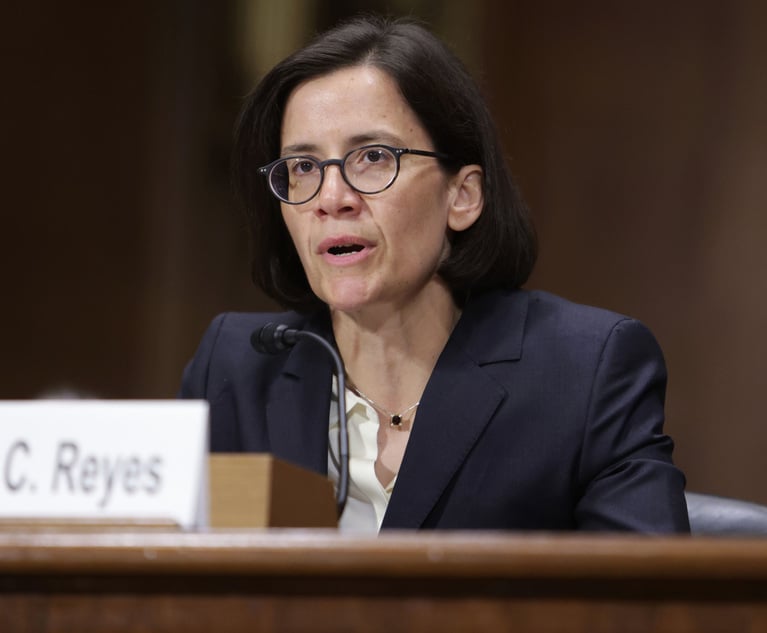North Carolina Wins Blackbeard Shipwreck Copyright Dispute
Congress will have to try harder if it wants to block states from using sovereign immunity to act as digital pirates, Justice Elena Kagan writes.
March 23, 2020 at 04:24 PM
4 minute read
 Cannons from the wreck believed to be Blackbeard's Queen Anne's Revenge on Nov. 21, 1996.
Cannons from the wreck believed to be Blackbeard's Queen Anne's Revenge on Nov. 21, 1996.North Carolina can keep on infringing Frederick Allen's copyrighted undersea videos of the Queen Anne's Revenge shipwreck, the U.S. Supreme Court ruled Monday.
The high court ruled unanimously that, just as it decided with patent cases 21 years ago, states are immune from copyright suits under the Eleventh Amendment. The ruling struck down the Copyright Remedy Clarification Act of 1990, which purported to strip states of immunity from copyright suits. It leaves standing "Blackbeard's Law," a 2015 North Carolina measure that explicitly permits the state to display photos and video from the salvage of the Queen Anne's Revenge, a pirate ship operated in the 18th century by Edward Teach, aka Blackbeard.
"The problem for Allen is that this Court has already rejected his theory," Justice Elena Kagan wrote for the court in Allen v. Cooper. "Here too, the power to 'secur[e]' an intellectual property owner's 'exclusive Right' under Article I stops when it runs into sovereign immunity."
The dispute stems from the 1998 discovery of the shipwreck by Intersal Inc. Because the wreck was technically property of North Carolina, Intersal formed a contract with the state to share the salvage rights. It provided Intersal the exclusive right to market most of the video accounts of the salvage.
Intersal in turn brought aboard videographer Frederick Allen, who spent more than a decade shooting video and still images documenting the underwater shipwreck and the efforts of divers and archaeologists to recover various artifacts from it. Allen registered 13 works with the U.S. Copyright Office, each covering a year's worth of footage.
Allen became concerned in 2013 that the North Carolina Department of Natural and Cultural Resources was displaying his works on its website. A settlement agreement provided that the department would display only non-commercial digital media bearing a watermark and a link to the department's, Intersal's and Allen's websites.
But in 2015 the North Carolina legislature enacted "Blackbeard's Law," a statute that makes public "all photographs, video records, or other documentary materials of a derelict vessel or shipwreck," among other things.
In ruling for the state, Kagan extended an olive branch to Allen and copyright holders in general. When Congress passed the Copyright Remedy Clarification Act, the Register of Copyrights was able to document only about a dozen instances of state infringement, including just two that were intentional. Lawyers and amici curiae for Allen had argued to the high court that the problem of state copyright infringement has increased dramatically since then.
Kagan said that if Congress were to revisit the issue and document substantial instances of due process violations, it might be able to enact "a tailored statute" that "can effectively stop States from behaving as copyright pirates.
"Even while respecting constitutional limits, it can bring digital Blackbeards to justice," Kagan wrote.
Justice Stephen Breyer concurred separately, joined by Justice Ruth Bader Ginsburg. He noted that they had dissented from Florida Prepaid in 1999 and continue to believe it was wrongly decided. But they joined Monday's opinion out of respect for stare decisis.
"One might think that Walt Disney Pictures could sue a State (or anyone else) for hosting an unlicensed screening of the studio's 2003 blockbuster film, Pirates of the Caribbean (or any one of its many sequels)," Breyer wrote, but not so under the court's jurisprudence. "Faced with the risk of unfairness to authors and inventors alike, perhaps Congress will venture into this great constitutional unknown," Breyer wrote.
Justice Clarence Thomas also concurred separately, saying that Kagan was putting too much emphasis on stare decisis. "If our decision in Florida Prepaid were demonstrably erroneous, the Court would be obligated to 'correct the error, regardless of whether other factors support overruling the precedent,'" he wrote.
He also wrote that Kagan went too far by outlining how Congress might create a work-around. "We should not purport to advise Congress on how it might exercise its legislative authority," he wrote, "nor give our blessing to hypothetical statutes or legislative records not at issue here."
North Carolina Deputy Solicitor General Ryan Park had the winning argument for the state. Quinn Emanuel Urquhart & Sullivan partner Derek Shaffer represented Cooper.
This content has been archived. It is available through our partners, LexisNexis® and Bloomberg Law.
To view this content, please continue to their sites.
Not a Lexis Subscriber?
Subscribe Now
Not a Bloomberg Law Subscriber?
Subscribe Now
NOT FOR REPRINT
© 2025 ALM Global, LLC, All Rights Reserved. Request academic re-use from www.copyright.com. All other uses, submit a request to [email protected]. For more information visit Asset & Logo Licensing.
You Might Like
View All
Federal Judge Warns of 'Serious Sanctions' on FDIC Over Document Retention
3 minute read
SEC Sued for Failing to Reveal Records Involving Simpson Thacher Attorney
4 minute read

Law Firms Mentioned
Trending Stories
- 1I’m A Lawyer, What Can I Sell?
- 2Internal GC Hires Rebounded in '24, but Companies Still Drawn to Outside Candidates
- 3How I Made Office Managing Partner: 'Don’t Be an Opportunity Killer,' Says Thomas Haskins of Barnes & Thornburg
- 4People in the News—Feb. 7, 2025—Gawthrop Greenwood, Lamb McErlane
- 5NY No-Fault Insurance Adopts Worker’s Compensation Fee Schedule
Who Got The Work
J. Brugh Lower of Gibbons has entered an appearance for industrial equipment supplier Devco Corporation in a pending trademark infringement lawsuit. The suit, accusing the defendant of selling knock-off Graco products, was filed Dec. 18 in New Jersey District Court by Rivkin Radler on behalf of Graco Inc. and Graco Minnesota. The case, assigned to U.S. District Judge Zahid N. Quraishi, is 3:24-cv-11294, Graco Inc. et al v. Devco Corporation.
Who Got The Work
Rebecca Maller-Stein and Kent A. Yalowitz of Arnold & Porter Kaye Scholer have entered their appearances for Hanaco Venture Capital and its executives, Lior Prosor and David Frankel, in a pending securities lawsuit. The action, filed on Dec. 24 in New York Southern District Court by Zell, Aron & Co. on behalf of Goldeneye Advisors, accuses the defendants of negligently and fraudulently managing the plaintiff's $1 million investment. The case, assigned to U.S. District Judge Vernon S. Broderick, is 1:24-cv-09918, Goldeneye Advisors, LLC v. Hanaco Venture Capital, Ltd. et al.
Who Got The Work
Attorneys from A&O Shearman has stepped in as defense counsel for Toronto-Dominion Bank and other defendants in a pending securities class action. The suit, filed Dec. 11 in New York Southern District Court by Bleichmar Fonti & Auld, accuses the defendants of concealing the bank's 'pervasive' deficiencies in regards to its compliance with the Bank Secrecy Act and the quality of its anti-money laundering controls. The case, assigned to U.S. District Judge Arun Subramanian, is 1:24-cv-09445, Gonzalez v. The Toronto-Dominion Bank et al.
Who Got The Work
Crown Castle International, a Pennsylvania company providing shared communications infrastructure, has turned to Luke D. Wolf of Gordon Rees Scully Mansukhani to fend off a pending breach-of-contract lawsuit. The court action, filed Nov. 25 in Michigan Eastern District Court by Hooper Hathaway PC on behalf of The Town Residences LLC, accuses Crown Castle of failing to transfer approximately $30,000 in utility payments from T-Mobile in breach of a roof-top lease and assignment agreement. The case, assigned to U.S. District Judge Susan K. Declercq, is 2:24-cv-13131, The Town Residences LLC v. T-Mobile US, Inc. et al.
Who Got The Work
Wilfred P. Coronato and Daniel M. Schwartz of McCarter & English have stepped in as defense counsel to Electrolux Home Products Inc. in a pending product liability lawsuit. The court action, filed Nov. 26 in New York Eastern District Court by Poulos Lopiccolo PC and Nagel Rice LLP on behalf of David Stern, alleges that the defendant's refrigerators’ drawers and shelving repeatedly break and fall apart within months after purchase. The case, assigned to U.S. District Judge Joan M. Azrack, is 2:24-cv-08204, Stern v. Electrolux Home Products, Inc.
Featured Firms
Law Offices of Gary Martin Hays & Associates, P.C.
(470) 294-1674
Law Offices of Mark E. Salomone
(857) 444-6468
Smith & Hassler
(713) 739-1250








